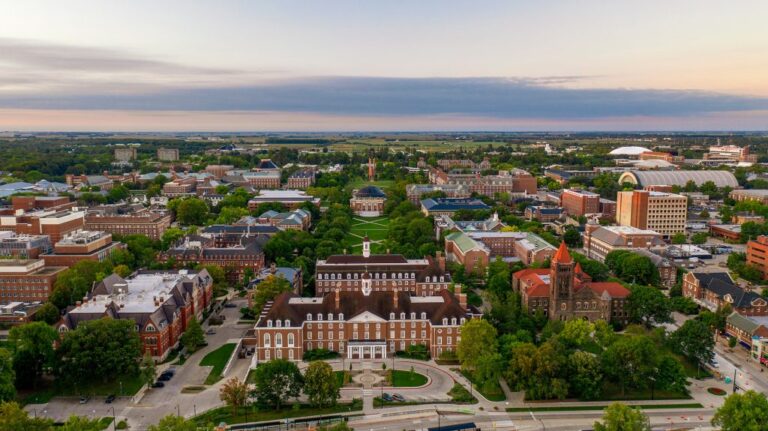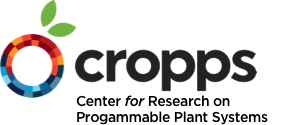Home » Education » REU Program » Participating Programs and Community
About the University of Illinois Urbana-Champaign

Since its founding in 1867, the University of Illinois Urbana-Champaign has earned a reputation as a world-class leader in research, teaching, and public engagement.
As a public land-grant university, it has the responsibility to create new knowledge and new ideas and translate these into better ways of working, living and learning for our state, nation and world. UIUC is consistently ranked among the top five universities for NSF-funded research, totaling more than $600 million annually.
UIUC faculty have been awarded Nobel Prizes, Pulitzer Prizes, and the Fields Medal in Mathematics. The success of faculty is matched by alums, which includes 11 Nobel Laureates, Academy Award winners, innovators, CEOs, sports stars, and more.

About the Center for Digital Agriculture
The Center for Digital Agriculture is a multidisciplinary effort at the University of Illinois at Urbana-Champaign between the Grainger College of Engineering, the College of Agricultural, Consumer and Environmental Sciences, and the National Center for Supercomputing Applications that leverage Illinois’ historic land-grant pillars of agriculture and engineering to shape the future of the agriculture industry. The center brings together researchers, educators, industries, and agricultural producers to innovate technology to transform how we feed and support a growing global population. CDA develops and supports novel experimental research facilities, such as the Illinois Autonomous Farm and the “farm of the future” where researchers will be able to develop and evaluate novel AI, sensor, data, and computing capabilities that enable small teams of producers to achieve increased yields and profitability with minimal or even positive environmental impact.

About AIFARMS
The Artificial Intelligence for Future Agricultural Resilience, Management, and Sustainability (AIFARMS) national AI institute is funded by USDA-NIFA. The broad mission of AIFARMS is to develop foundational advances in AI and apply them to ensure that future agriculture is environmentally friendly, sustainable, affordable, and accessible to diverse farming communities. To accomplish this mission, the AIFARMS Institute aims to develop and demonstrate the advances in AI necessary to address major challenges facing world agriculture, by combining basic research, novel experimental facilities, state-of-the-art data analytics, and eventually evaluation in production settings. AIFARMS is primarily hosted at the University of Illinois Urbana-Champaign in the Center for Digital Agriculture and the National Center for Supercomputing Applications. Team members span the Grainger College of Engineering, the College of Agricultural, Consumer, and Environmental Sciences, Siebel Center for Design, and USDA-ARS. Sub-awardees include Tuskegee University, Donald Danforth Plant Science Center, University of Chicago, Argonne National Laboratory, and Michigan State University.

About CROPPS
The Center for Research on Programmable Plant Systems (CROPPS) will generate foundational discoveries through interactive, experimental designs and prototype translational solutions for improved crop performance. Our approach, coupled with the IoLT framework, defines a new transdiscipline—digital biology—with powerful, broad implications for plant science, agriculture, and other domains of the life sciences. CROPPS is NSF STC award led by Cornell University with collaborations from the University of Illinois, and Arizona University,
About Champaign-Urbana
The twin cities of Champaign-Urbana (C-U) are a micro-urban community that offers serious business, technology and innovation capabilities while maintaining a small-town feel in downstate Illinois. The two downtowns are separated by just a few miles, easy enough to access by bicycle or public transportation and both host highly-rated restaurants, bars and community events, including The Pygmalion Music Festival, Ebertfest, the Urbana Sweetcorn Festival, multiple farmers’ markets and much more. C-U is rated as the #2 college town in the United States by BusinessInsider.com and regularly rates highly in fun, growing, healthy, and affordable rankings.
Champaign-Urbana is not only easy to get to, it’s easy to navigate. Conveniently situated off three major interstates, C-U is nearly equidistant from Chicago, Indianapolis, and St. Louis by 2-3 hours. Fly into our accessible airport, ride the Amtrak, take a bus, or drive! Once here, C-U has several accessible and affordable transportation options. Our award-winning mass transit district (MTD) will help get you around our community, as will rentable bikes and e-bikes.
About Inclusive Illinois: One Campus, Many Voices
Inclusive Illinois Initiative is a collaborative effort across campus to enhance outreach efforts to underrepresented populations, inspiring students to see the impact they’ll have at UIUC and beyond. It’s a commitment to cultivating a diverse, inclusive, and equitable community at UIUC where everyone is welcomed, celebrated, and respected.
Center for Digital Agriculture Code of Conduct
The Center for Digital Agriculture believes that everyone within the CDA community, faculty, staff, and students must have an opportunity to help define, shape, and lead the future of digital agriculture. Because of this, we expect all members to uphold the highest professional standards, including in conduct, ethics and respect. We do not tolerate discrimination, harassment, or abuse of power. CDA promotes an environment that offers respectful discussion among individuals. In any cross-disciplinary environment, not all viewpoints will align, but we ask that all voices be heard. We believe that hearing and respecting different perspectives is not only ethically required but beneficial to our core mission of interdisciplinary science and education. For this reason, we require members to listen carefully to, support and be respectful to one another in their interactions and discussions, regardless of personal or professional backgrounds.

©2021 Board of Trustees of the University of Illinois. | Web Privacy Notice
About Cookies
Cookies and related technologies (herein “Cookies”) are small text files that a website saves on your computer when you visit the site. Cookies the University sets are called first-party Cookies. The data collected might be about you, your device, your preferences, or your login information. This data is mostly used to make the website work as expected so, for example, you don’t have to keep re-entering your credentials whenever you come back to the site. Cookies set by third parties are called third-party Cookies. We use third-party Cookies for analyzing website traffic and our advertising and marketing efforts. We have divided the Cookies we use into the following categories: Strictly Necessary, Performance, Functional, and Targeting. Under each category heading below you will find a general description of the Cookies in each category. You can change your browser settings to block, delete, or alert you to Cookies. The Help menu on the menu bar of most browsers will tell you how to do that. However, if you do, you may have to manually adjust preferences every time you visit a site and some features may not work as intended.
Cookie Categories
Strictly Necessary Cookies are first-party Cookies that are necessary for the website to function. They can be either permanent or temporary and are usually only set in response to actions made directly by you that amount to a request for services, such as logging in or filling in forms. For example, we use Strictly Necessary Cookies to handle user registration and login. Some sites require the use of Strictly Necessary Cookies to access the site, such as University websites requiring University credentialed authentication. If you set your browser to block or delete Cookies, you may not be able to access the site or some parts of the site will not work.
Always Active
Performance Cookies allow us to count visits and traffic sources so we can measure and improve the performance and effectiveness of University websites. Performance Cookies also help the University understand which webpages are the most and least popular, see how visitors move around the site, and determine whether webpage content is relevant to user interests. Performance Cookies may be first-party or third party, permanent or temporary, and do not personally identify individual visitors. Some Performance Cookies are “analytics” Cookies (e.g., Google Analytics), using third-party software tools, which help us understand more about how our websites are used and where visitors come from by collecting and aggregating anonymous information on the pages visited and any advertisements viewed. The University does not take responsibility for the collection, use, and management of data by any third-party software tool provider unless required to do so by applicable law. If you set your browser to block or delete Cookies, some site services and functionalities may not work.
Always Active
Functional Cookies enhance the performance and functionality of our websites but are non-essential to their use. These permanent Cookies allow our website to remember information from your previous visits, such as details you submitted before or your previously stated preferences. These Cookies may also be used to provide services you request, such as newsletters or publications. They may be first- or third-party Cookies that enable services we have added to our webpages. If you set your browser to block or delete Cookies, some or all of these services may not function properly.
Always Active
Targeting Cookies are used to deliver content tailored to your interests and may be temporary or permanent. They may also be first-party or third-party Cookies. Targeting Cookies are based on uniquely identifying your browser and device; they do not store information such as your name. The University may use targeting Cookies prepared by the University, its third-party contractors, or advertising partners to provide you with personalized University display advertising and promotional material about the University and its programs. The University may also allow third parties to place Cookies on your device that collect and use anonymous information about your visits to, and interactions with, our websites to personalize advertisements and promotional materials for University goods and services. Targeting Cookies may be used by our third-party contractors or our advertising partners to build a profile of your interests and show you relevant advertisements on other sites. We may share information about your use of our site with our social media, advertising, and analytics partners who may combine it with other information that you have provided to them or that they have collected from your use of their services. If you set your browser to block or delete Cookies, you will still see advertisements, but they will be less targeted to your interests.
Always Active
